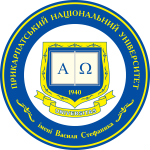Synthesis and thermoelectric properties of nanostructured materials on the basis of Pb(Sn)-Cd(Zn)-Te solid solutions
Project duration: October 2017 – November 2019
Grant holder: Vasyl Stefanyk Precarpathian National University (Grant of the Ministry of Education and Science of Ukraine for young scientists)
Project goals: Development and optimization of chemical composition and technological processes for obtaining of thermoelectric materials basis on alloyed Pb(Sn)Cd(Zn)Te solid solutions for thermoelectric modules in temperature range (500-850) K.
Specific project objectives are:
- Synthesis of homogeneous and doped solid solutions of Pb(Sn)Cd(Zn)Te: M (M = Sb, Bi, Ag, Au).
- Study of the change in the phase composition and structural state, depending on the technological terms for obtaining of the materials and its chemical composition.
- The study of temperature dependence of thermoelectric parameters of the samples due to different chemical compositions, size of fractions and pressures of pressing.
- The study of the dependence of thermoelectric parameters of samples on the conditions of thermal processing of samples.
- The optimize of switching technology for thermoelements, make thermoelectric module and measure its voltage-current characteristics.
- Determine the terms of conditions of the thermoelectric converters that provide optimal efficiency for use as generators of electric power.
Expected results:
- The graphical and tabular dependences of structural parameters (phase composition, element cell parameter) and thermoelectric characteristics (specific conductivity, Seebeck coefficients and thermal conductivity) on the chemical composition and technological terms of obtaining polycrystalline ingot and pressed thermoelement will be obtained (temperature mode of synthesis, size fractions, compression pressure, annealing temperature). The temperature dependences of thermoelectric parameters in the temperature range 300-700 K will also be obtained for thermoelements.
- The volt-ampere characteristics, as well as their temperature dependences will be obtained for thermogenerators made on the basis of the studied thermoelements.
- The needs for military and defense equipment that require autonomous energy sources and refrigeration units will be taken into account. Of all the devices of this kind, thermoelectric generators are the most promising ones.
Contact person and project manager in Vasyl Stefanyk Precarpathian National University: Ihor HORICHOC, Ph.D., post-doc, e-mail: horichokihor@gmail.com

